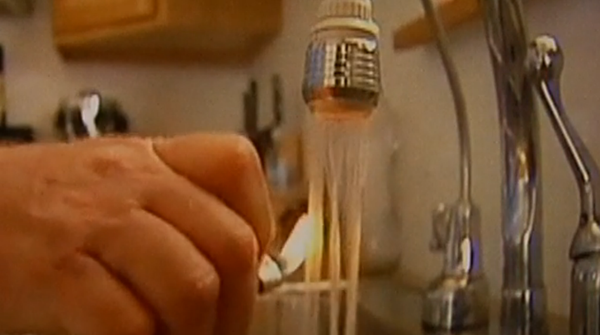
Student activists and SUNY New Paltz professors discussed the potential risks of hydraulic fracturing (hydrofracking) and also screened the documentary “The Sky Is Pink” on Thursday, Nov. 1.
The New York Public Interest Research Group (NYPIRG) held the event to voice concerns of potential risks of hydrofracking, a method of natural gas and oil extraction in which water is pumped into shale beds in order to fracture the rock, releasing the oil and gas.
The 18 minute-long documentary focused on the issue of fracking in New York State, calling into question the safety and ethics of the gas drilling.
Director Josh Fox presents evidence suggesting hydrofracking poses risks to the New York City watershed. He also suggests the industry is trying to push forward despite knowledge that the practices pose serious environmental and health concerns.
“Just as there is no safe cigarette, there is no safe drilling,” Fox said.
The panel discussion was held after the screening and included presentations from geology Professor Alvin Konigsberg, political science Professor Dan Lipson and SUNY New Paltz alumnus and activist Joe Ruotolo.
While they said that the public opinion remains divided, the message the panel delivered was clear: there should be no gas drilling in New York.
Konigsberg voiced his concerns to the crowd, particularly regarding the safety of New York’s ground water.
“I don’t think we understand the geology as much as we should right now,” Konigsberg said.
Konigsberg said he believes that if the chemicals were to mix with the water and those present in the shale entered the groundwater, they could cause serious long-term environmental damage.
“If we start breaking this stuff up…it’s going to end up somewhere else,” Konigsberg said.
Lipson said the problem isn’t just the gas. He said he sees an economic quagmire in the making.
“This is a classic bubble that’s going to burst before it ever gets started,” Lipson said.
Lipson said the economic growth model has been made possible by the abundance of fossil fuels, however he believes that it is “time…to look at the new economy,” as the age of cheap energy is over.
Ruotolo presented photographs from Dimock, Pa., a site of intense fracking. The photographs showed the water containers needed for clean drinking water, fracking sites and pro and anti- fracking propaganda.
“Most people [in Dimock] are pro-fracking,” Ruotolo said.
However, Lipson said he holds a more skeptical attitude about the future of fracking in New York: he said despite the influence of the gas industry, there are plenty of “anti-fracking sentiments from those with ‘moneyed and powerful interests.’”
Lipson said that if the gas drilling does proceed, much of the product will be exported to China, ultimately having little effect on American gas prices.
“Natural gas prices are driven artificially low due to fraudulent lies to investors,” Lipson said.
Lipson said he believes that the gas prices will not provide the economic advantage the industry touts.

